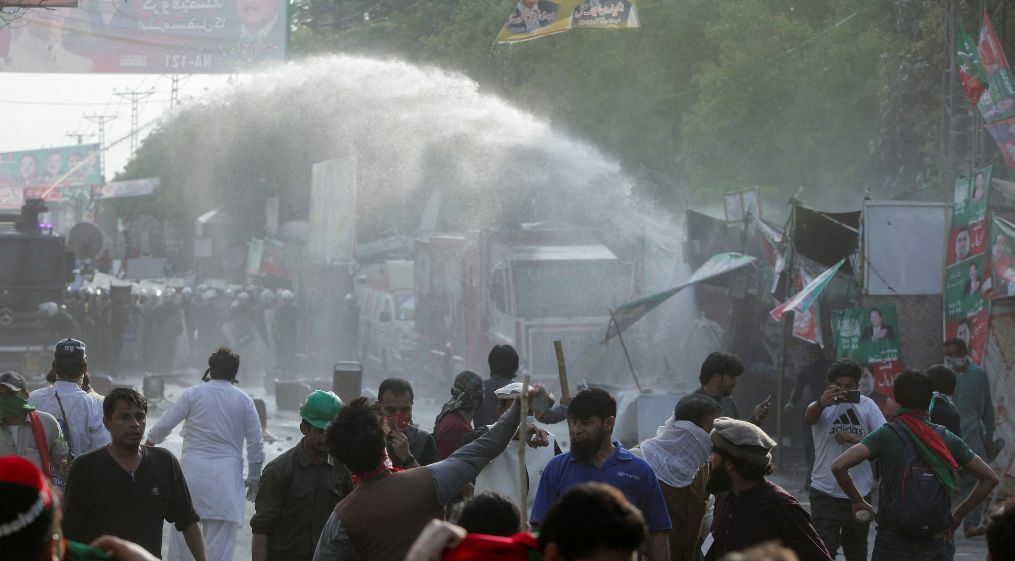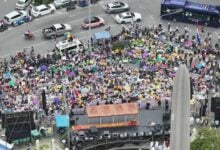Protests across Pakistan after Imran Khan’s arrest and military rebuke

Protests broke out across Pakistan following the arrest of former prime minister Imran Khan during a court appearance in the capital, Islamabad. The arrest comes amid political turmoil and hours after the powerful military criticised the former international cricketer for accusing a high-ranking military officer of plotting to kill him. Demonstrators in several cities directed their anger at the military, with some even storming the residence of the corps commander in Lahore and laying siege to a gate at the army’s general headquarters in Rawalpindi.
Police used tear gas and water cannons to disperse Khan’s supporters in Karachi and Lahore, while protestors blocked roads in Islamabad and other cities, including Peshawar. In reaction to the unrest, both the United States and the United Kingdom called for adherence to the “rule of law” in Pakistan, while authorities restricted access to social media platforms such as Twitter and Facebook, according to global internet monitor NetBlocks.
Imran Khan faces numerous charges since being ousted last year – a tactic which some analysts say is employed by successive Pakistani governments to silence opposition. If convicted, Khan could be barred from holding public office, excluding him from the elections scheduled for later this year.
During yesterday’s incident at the Islamabad High Court, Ali Bukhari, a lawyer from Khan’s Pakistan Tehreek-e-Insaf (PTI) party, reported that dozens of paramilitary rangers attacked them, beating and dragging Khan away. Interior Minister Rana Sanaullah, however, stated that Khan’s arrest by the National Accountability Bureau (NAB), the nation’s top anti-corruption body, is in accordance with the law.
The PTI announced it would challenge the arrest, with party leadership set to come together on Wednesday morning to approach Pakistan’s Supreme Court. Vice Chairman of the party, Shah Mehmood Qureshi, called for demonstrations to continue lawfully and peacefully and criticised police treatment of protestors.
Following a pre-recorded video message released by Khan anticipating his arrest, tensions escalated further as he urged supporters to fight for their constitutional and democratic rights. In Peshawar, a mob demolished the Chaghi monument, a sculpture honouring the location of Pakistan’s first nuclear test.
Speaking about the unfolding events in Pakistan, US Secretary of State Antony Blinken expressed the need for consistency with the rule of law and constitution, while British Foreign Secretary James Cleverly advocated a peaceful democracy in the country.
Currently, Pakistan is facing a significant economic and political crisis, with Khan pushing the struggling coalition government for early elections. Over the weekend in Lahore, Khan reiterated claims that senior intelligence officer Major-General Faisal Naseer was involved in an assassination attempt last year, during which he was shot in the leg.
The military’s Inter-Services Public Relations (ISPR) wing refuted these fabricated allegations, calling them “deplorable and unacceptable.” Pakistan’s government maintains that a lone gunman, who is currently in custody, carried out the assassination attempt. Khan, however, dismisses these assertions and insists on authorities refusing to entertain his attempts to file a report with the police identifying the true culprits.
With a history of at least three coups since the country’s independence in 1947, Pakistan’s military, the world’s sixth-largest, exerts considerable influence over the nation, reports Channel News Asia.
Latest Thailand News
Follow The Thaiger on Google News:


























